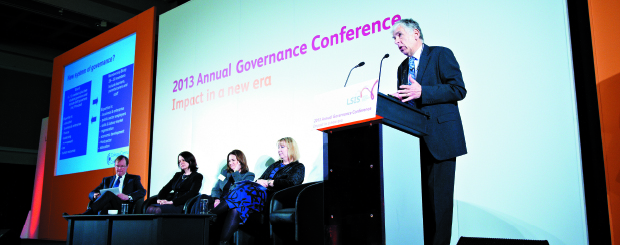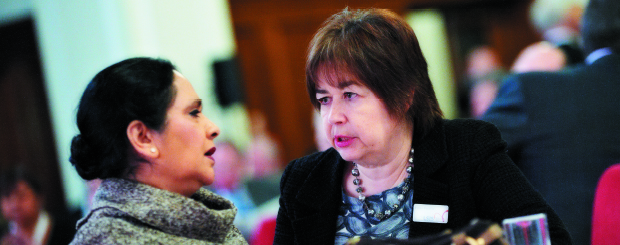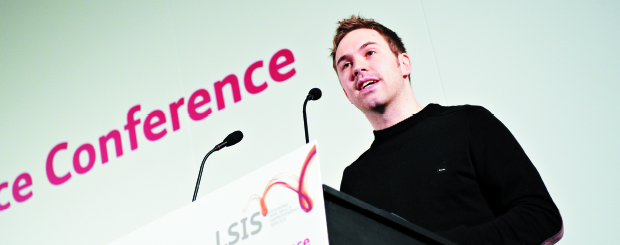On the first day, conference chair Professor Bill Lucas and Exeter College principal Richard Atkins talked about the sector’s renewed focus on teaching and learning. Delegates also heard more about the new Ofsted common inspection framework from senior inspector Beverley Barlow. They also took part in interactive and workshop sessions.
The major theme of the day was: given the enhanced status of teaching and learning, with the Commission on Adult Vocational Teaching and Learning (CAVTL), the Ofsted framework, the massive increase in apprenticeships and the pressure to make sure that the pedagogy is right, what’s the role of governance in all of this?
The day explored how governing bodies can be more actively involved at an appropriate governance level, without dipping into management.
How can governors be strategic, ask the right questions but not end up doing the stuff that’s really an executive function?
One example that came out in the afternoon sessions was that traditionally at board meetings, you spend 70 per cent of your time talking about money, buildings and staff contracts and 30 per cent on learning, student voice and student engagement. Why not reverse it?
Governors were asking questions such as: ‘I don’t really understand teaching and learning. When I went to school or college or university, it was very different so how would I know what good is?’ ‘How can we ensure that we have on our governing body the kind of breadth that would enable us to have the best advice on teaching and learning?’
Delegates also looked at the two strands which often exist in FE vocational teaching. There’s whatever the vocational subject is, whether it’s as a plumber or a hairdresser or an accountant or an engineer, and there’s the teaching bit.
To be outstanding you need to have an outstanding teacher with relevant recent experience in that particular vocation.
That arguably makes teaching and learning in a college in many ways more complex than academic teaching in a school. If you asked the man or woman in the street they’d probably say the reverse.
Day two opened with a funding and finance panel.
Here’s some of the questions and answers from panellists Bobbie McClelland, deputy director at the Department for Business, Innovation and Skills, Peter Lauener, chief executive of the Education Funding Agency, and Kim Thorneywork, chief executive of the Skills Funding Agency.
How can splitting funding into two sets of terms and conditions possibly be a simplification?
KT: The two funding systems from the adult side and the young people’s side were designed to underpin different sets of priorities…
On the adult side we have only one set of terms and conditions, and part of the simplification was to move from two strands of funding, learner responsive and employer responsive, to a new system, with one set of funding rules and one set of terms and conditions.
Two years ago there was a huge pile of funding rules. We went to single document last year and we’re launching an interactive form because we do know, particularly for college governors and finance directors, that seeing the evidence requirements and the audit requirements against the funding requirements is important.
However, there is still more to do. We’ve been working with the education funding agency to work towards a single financial memorandum for colleges.
What happens if FE loans are not taken up?
BM: We’ve done a lot of work in this area looking at the potential impact of loans.
We’ve asked individuals their views and we’ve had a very positive reception. When you then explain the terms and conditions, loans have been welcomed.
So we’re confident there is the capacity and inclination there for people to take it up. It does require the technology and that’s on track for delivery in the next few weeks, but it’s also dependent on providers and colleges engaging with learners for them to understand how to access loans.
Where will the money come from for 16 to 19 traineeships?
PL: Traineeships are not a new programme with a separate funding line — and introducing a separate funding bundle would be a really retrograde step. Funding is already in the system for 16 to 19 and we’re well advanced with the funding applications for 2013/14.
For 16 to 19, the principles of traineeships will be similar to those of study programmes.
But with the emphasis on work experience, and English and maths for those who didn’t get that at 16, with progression on to apprenticeships or jobs. The funding will be there.
Caption for featured image: Panel from the second day of the conference. From left: Professor Bill Lucas, from the University of Winchester, Kim Thorneywork, chief executive of the Skills Funding Agency, Peter Lauener, chief executive of the Education Funding Agency, and Bobbie McClelland, deputy director at the Department for Business, Innovation And Skills. Pictures by Andy Whitehead for FE Week
_____________________________________________________________________________
“Is small beautiful?” was the big question for a session called ‘Debating the smaller board’, chaired by Professor Bill Lucas, with contributions from, amongst others, John Graystone, chief executive of Colegau Cymru, Jennifer Foot, clerk at Carlisle College, Sue Daley, director of the Women’s Leadership Network, and Carole Stott, chair of the Association of Colleges.
John Graystone (pictured above) introduced the debate with the key issues of the situation in Wales:
“The Welsh Assembly government… set up the Humphreys Review [in 2011] to look at corporations but also to explore… the accountability of governing bodies, and basically argued for smaller boards.
“His [Rob Humphreys, director for Wales at the Open University] view was that a smaller board would only work if you had a larger membership body to give accountability to the local community.
“The main criticism of governing bodies was ‘well who are you answerable to?’
“This was quite a simple model of governance, a smaller board of 10 to 12, that would include student and staff governors, drawn from a wide range expertise as they already are…
“It would be linked into a membership body, which Humphreys said should be from 25 to 50 people… Those in the membership group would have complementary expertise and their purpose would be to hold the board to account.
“The membership body would be appointed by an independent search committee and would challenge the board over the achievement of objectives.
“A number of colleges are very interested in taking forward this model… so we’re going to try this out and see if it will help to make colleges more closely linked to local communities.”
_____________________________________________________________________________
Fintan Donohue, chief executive of North Herts College (pictured above), spoke about taking risks and entrepreneurial governance.
He said: “We all have different hopes for our colleges and my hopes are very much on the entrepreneurial focus and risk–taking, and the changes I believe many of us are going to have to embrace if we’re going add any real value to our communities.
“For those of us in the Gazelle group, we’re trying to focus on whether or not our role and the role of our boards are significantly more than the provision of publications, but actually about building wealth and opportunity and resources.
“My proposition is that … governing bodies have a legitimate role in questioning the quality not just of traditional pedagogy but actually the impact of what that teaching and learning is doing at community level…
“So the challenge I present is ‘are we really thinking outside the traditional paradigms? Do we really need to start to debate what a truly entrepreneurial culture looks and feels like, that can add greater value to our community and make more of the resources we’ve got?’
“Our students… are not going to emerge into employment in any serious way… in the immediate future. Therefore their only future is to create their own wealth, confidence and employment in much larger numbers than they’ve ever had to do before.
“Therefore the challenge for us and our corporations I think is to say how do we make that happen?”
_____________________________________________________________________________
Asha Khemka OBE, principal of West Nottinghamshire College speaking to Helen Pettifor, executive director of leadership and professional development
In her remarks to close the conference, Asha Khemka OBE, principal and chief executive of West Nottinghamshire College, said: “It’s been an amazing conference. You have been engaged with keen interest in debating the very pressing issues of our time.
“The spectrum of the topic we have debated has covered the full range of the challenges we face, the things we do well, and the things we need to do even better.
“In talking to groups of governors in the past few days, I have discovered a keen interest in being closer to teaching and learning, and to understand data.
“When I opened the conference, I outlined three key challenges: steering learning, steering impact, steering reputation. I am sure that you will agree there has been full debate, and lots of exemplars are best practice in our sector.
“How do we make sure that dialogue continues? How do we make sure that there’s a framework in place to continue to support our governors and clerks?
“Some of you are well ahead of the game, with systems and processes in your colleges where you are closer to teaching and learning… Some of you are anxious and not clear how to ensure teaching and learning are right. For that there is no quick answer but there are going to be regional teaching and learning workshops…
“On data… bring a group together sit down and look at what you are getting and ask ‘is this the right information? Does it show us destination and progression?…’
“What we need to be asking is ‘are we skilling our students for the right jobs? If we are going to be competing in the global market place, are we giving them the right skills and opportunities?’
“I hope moving forward you will reflect back on your journeys, what we have been able to debate and discuss at this conference, and I hope that you found the conference useful.”
_____________________________________________________________________________
One of the most rousing speeches was given by Liam Burns, president of the National Union of Students (pictured above), on learner–led feedback.
“I was NUS president of Scotland, where 90 per cent of my time was spent… trying to assert parity of esteem between the college and university sectors,” he told delegates.
“Our post–16 system is riddled with strange assumptions that do us absolutely no good in the modern age… we compulsively rank our universities and colleges and compulsively ignore our FE sector… I want to argue for a truly tertiary education system that will shatter these false boundaries and the false oppositions between them.
“Why not further education after higher education? Why not the two at exactly the same time?… Is it really beyond us to enable people in this country to study a history degree and a BTec in management? …Other countries, other economies and other societies don’t believe so.”
He moved on to talk about student representation after New Challenges, New Chances.
“We had a fight to keep student membership of your corporations,” he said. “Some of you have reduced the number of student governors from two to one…. Some colleges changed it just because they can. Some of you don’t have proper student unions in your colleges, because you don’t have to…
“To those this applies to, I say: be careful. Just because you are free to do these things, doesn’t mean you should… just because you don’t have a curfew anymore, doesn’t mean you should stay out all night.
“Elected student unions are not a luxury they are a necessity.
“If you’re going to decry that we don’t have enough politicians who come from vocational backgrounds, if you’re going to rightly challenge that we don’t have enough sector leaders who know colleges inside out, then that responsibility is on your doorstep, because if you think you can do learner engagement simply by sending out surveys rather than engaging young people to be active leaders… then that’s not our fault, that’s yours.
“Could your time [as a governor] be about celebrating your place in taking tertiary education allowing those most disenfranchised in society to thrive? I think the answer… is yes.”






Your thoughts